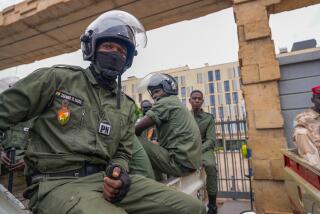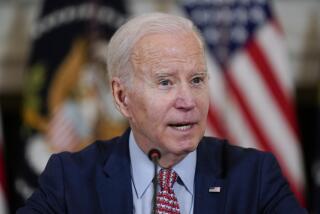S. Africa Ends Natal Province State of Emergency
- Share via
JOHANNESBURG, South Africa — President Frederik W. de Klerk, meeting a key demand of the African National Congress, lifted the four-year state of emergency in strife-torn Natal province on Thursday and declared the way clear for constitutional negotiations.
With his action, the president also met one of the five conditions necessary for lifting American economic sanctions against Pretoria. Only two conditions remain: the freeing of political prisoners and the repeal of all apartheid legislation.
“The door to (negotiations) is now fully open, and I am appealing to all leaders and all South Africans to accept the challenge of this open door,” De Klerk said at a news conference in Pretoria.
Marlin Fitzwater, President Bush’s press secretary, said De Klerk’s action was “yet another important landmark on the road toward full normalization of political activity in South Africa.” He added, “We believe that President De Klerk deserves credit for his political courage and leadership.”
De Klerk said conditions in Natal have stabilized “to such an extent that the ordinary laws of the land are again sufficient to enable the government to . . . maintain public order despite continuing sporadic violence.”
The province of Natal, on the Indian Ocean coast, has been racked by three years of internecine warfare that has killed nearly 4,000 blacks.
The fighting, primarily among Zulus, has pitted supporters of Nelson Mandela’s ANC against those of Mangosuthu Gatsha Buthelezi’s Inkatha Freedom Party. But it has been fanned by the region’s poverty, scarce resources and a housing shortage that has forced tens of thousands of blacks to live in shacks without running water.
The ANC and Inkatha began peace talks in Natal a few weeks ago, and both sides report substantial progress.
For months, the ANC and relief workers in Natal have complained that the extra powers granted the police under the emergency have exacerbated rather than eased tensions in the region.
“We didn’t think (the emergency) was necessary, except possibly to make whites feel more secure,” said Paul Graham, director of the Institute for a Democratic Alternative in Durban. “We could well have done without it.”
Law and Order Minister Adriaan Vlok said he does not intend to withdraw any of the several thousand police or troops in the region.
“We don’t have enough policemen there now,” Vlok said. “We need more to ensure there’s not another flare-up.”
At least 26 people have been killed in unrest in Natal this month, including six blacks who died in a bus ambush. Three white men, two of them right-wing extremists, have been arrested in that attack.
The ANC, in a statement issued in Johannesburg, welcomed De Klerk’s move, saying it will help create a climate for free political activity and peace.
More to Read
Sign up for Essential California
The most important California stories and recommendations in your inbox every morning.
You may occasionally receive promotional content from the Los Angeles Times.











